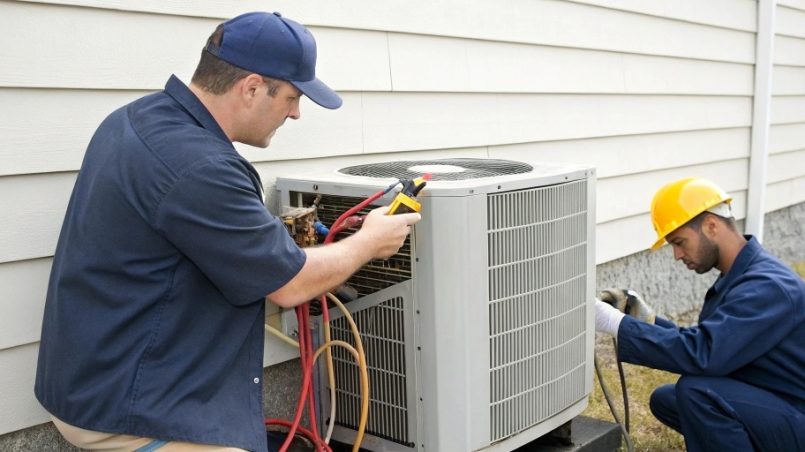Cold weather doesn’t wait for your schedule, and your HVAC system shouldn’t either. As the temperature drops, skipping simple pre-winter checks could leave you wrapped in blankets and dialing for emergency help. Let’s break down what HVAC pros in Nashville, TN, wish more people knew—quick, smart steps you can handle right now to keep your heat flowing without a hitch.
Test the Thermostat Response and Heat Cycle
One of the fastest ways to know something’s wrong? The thermostat doesn’t listen. Flip it over to heat mode and slowly raise the temperature a few degrees above the current room reading. If the heating system doesn’t kick in within a minute or two, something’s off.
Professionals offering heating and cooling in Nashville TN often find the issue isn’t the furnace—it’s the thermostat. Sometimes it needs a new battery, or the wiring has loosened over the summer. Don’t wait until the first frost to discover your thermostat has trust issues. Testing the heat cycle ensures your system activates correctly, warms up evenly, and runs long enough without short cycling.
Clear Vents and Registers of Obstructions
This might sound obvious, but blocked vents are sneakier than people realize. Furniture gets moved around, curtains droop lower, and suddenly your airflow is gasping. Blocked registers make your HVAC unit work harder than it should, trying to push warm air through clogged paths.
If you’re searching for reliable heating and cooling near me, keep in mind most HVAC in Nashville TN stress the importance of airflow. Go room by room and make sure every vent has at least a foot of open space around it. Clear out dust and debris from both the grates and the duct area behind them for an easy efficiency win.
Replace the Furnace Filter with a Clean One
Dirty filters are one of the most common reasons homeowners call for HVAC in Nashville TN. A clogged filter chokes the system, reduces airflow, and lowers your indoor air quality—not exactly the cozy winter vibe you’re going for.
Swapping your furnace filter only takes a couple of minutes but can extend the life of your HVAC unit dramatically. It also prevents overheating and unnecessary shutdowns. Ideally, filters should be changed every 1-3 months, but if you’ve got pets or allergies, monthly changes are best. Professionals offering HVAC near me often find that this one simple act prevents a cascade of other issues.
Listen for Unusual Noises During System Startup
Silence may be golden, but the right kind of sound from your HVAC is comforting—like a familiar hum. What’s not welcome? Clanks, rattles, or loud bangs when your system starts up. These could be signs of loose parts, ignition delays, or worn-out blower belts.
Heating and cooling in Nashville TN often begins with customers describing strange sounds. Catching these early can stop a small fix from becoming a major system failure. If you hear metal-on-metal or high-pitched squealing, call a professional fast. It’s like your system trying to whisper that it needs help—don’t ignore it.
Check Outdoor Unit for Leaves and Blockages
Outdoor units take a beating during fall. Leaves, sticks, mulch, and even plastic bags can get caught in the coils or vents. A blocked unit means poor airflow and added stress on your system just as it’s gearing up for winter.
Clear a 2-3 foot radius around your heat pump or AC compressor. Gently rinse off the outer coils with a garden hose (make sure power is off first). Nashville TN HVAC experts often find systems struggling simply because the outdoor unit can’t breathe. This small act keeps things running smoother and prevents overheating.
Confirm Carbon Monoxide Detectors Are Working
This check has nothing to do with heating comfort and everything to do with safety. Gas furnaces can, if malfunctioning, leak carbon monoxide—a colorless, odorless gas that’s incredibly dangerous. Confirm your CO detectors are working, have fresh batteries, and haven’t passed their expiration date (yes, they do expire).
Professionals in HVAC in Nashville TN strongly recommend testing CO alarms monthly during heating season. Place detectors near bedrooms and your furnace room. It’s not just a smart step—it’s a life-saving one. If you’re using any gas heating system, this should be at the top of your checklist.
Inspect Weather Stripping Around Doors and Windows
You could have the best HVAC near me, but if your warm air is escaping through gaps, you’re wasting money. Weather stripping wears out, peels off, or gets compressed over time. Cold drafts sneaking through windows and door frames can reduce your indoor comfort and make your system work overtime.
Run your hand around door edges and window seams. If you feel air movement, it’s time for a quick trip to the hardware store. Nashville TN HVAC experts often point out how sealing drafts boosts system performance and lowers your energy bill. A simple tube of caulk or foam tape can go a long way in keeping the chill outside where it belongs.


